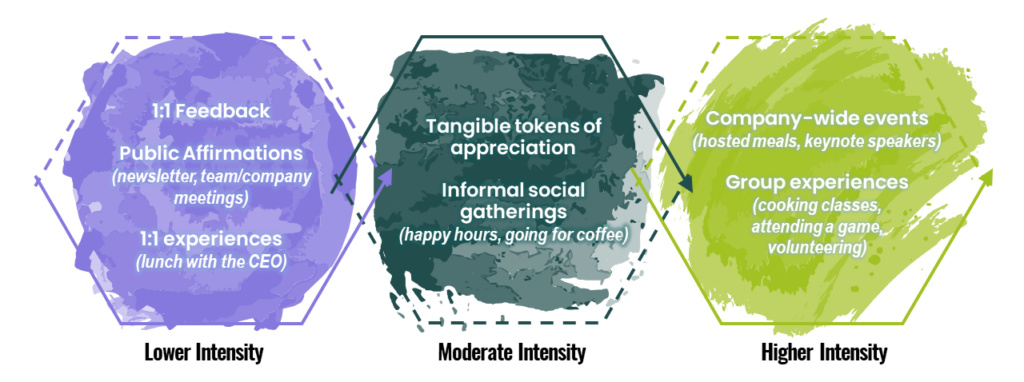
The Benefits of Taking Time to Reflect on Your Successes
In today’s hectic work environment, it can be all too easy to become so focused on productivity that we forget the basic human need for affirmation.
As someone who leans heavily toward a Type A personality, it has felt more natural to quickly move on after having accomplished a particular goal. (I suppose some of this is influenced by my childhood upbringing; something to do with not resting on my laurels). In doing so, my intent was to keep momentum going. However, when leading others, this can send the wrong message to colleagues and teammates. They may feel a lack of appreciation for their contributions and support or, even worse, glossing past these opportunities to honor wins can end up promoting a culture of “burnout and churn”.
Taking the time to acknowledge successes and to celebrate wins need not be extravagant and may also be a great opportunity to reinforce positive and productive behaviors and practices to fuel future success. This positive feedback loop can be even more powerful than constructive or critical feedback. I remember someone with whom I used to work observing that her colleagues and supervisors were consistently dispensing feedback on how she could do better but rarely, if ever, affirmed what she was doing right (and should continue to do) – something she really would have benefited from.
Regardless of your personal preference regarding affirmations, it is important to remember that it matters and can make a big difference to others. This type of positive acknowledgement can go a long way to promote a purpose-driven culture in which people feel seen, valued, and personally connected to something important. This, in turn, engages individuals and teams to invest deeply in the overall success of the company.
What Does It Mean to Celebrate Wins?
When we think about company successes, our minds often gravitate to major milestones and heroic outcomes against seemingly impossible odds. And yet, every day there are smaller wins that, when added up, contribute to moving the company closer towards achieving its vision. Each of these are mental milestones that break up the otherwise seemingly endless journey to success.
Celebrating wins can be as involved as formal festivities to private, individual affirmations (see Figure 1). Balancing the circumstances with what is practically and sustainably appropriate can help you right-size celebrating successes. For example, a small start-up may not be able to afford a large, catered celebratory event, but they can certainly infuse recognition and affirmations for individuals and teams in 1:1s, team meetings, and existing company events.

Why Is Celebrating Wins Important?
Acknowledging accomplishments is a great opportunity for building momentum to achieve company success and, arguably, is far more effective than barreling forward to the next project without regard for the gains being made by the team and company as you go.
- Fueling Team Morale
Imagine being told to run a marathon with no information on how long the race is, if or when there will be rest stops, or anything about the terrain. That bleak, never-ending horizon can grind a person down to the point where, if they stay with your company, they will most likely keep their head down and focus on just getting by. Conversely, in combination with the EverSparq approach to cultivating a purpose-driven culture to create greater clarity about the journey ahead, celebratory moments are milestones that serve as important “rest stops” where people can refuel and recharge as they take stock of what has been accomplished and how they have moved the ball forward. - Promoting Consistent Focus
Successes are powerful opportunities to reiterate the strategic goals and objectives of the company. Assuming that the milestone helps move the company towards achieving the vision and company goals, it is worth being explicit in connecting those dots. Doing so in a positive context can go a long way in educating colleagues on the key priorities of the organization and how their efforts and wins contribute to the overall success of the company. - Providing Positive Reinforcement
Affirmations can also highlight what, specifically, contributed to the success and why a particular accomplishment is being celebrated. Describing how an individual or team went about achieving their goal(s) can provide ideas for others to apply in their efforts. It also reinforces skills, talents, and positive behaviors that not only drive success but are reflective of company values. Finally, celebratory moments can build staff confidence that they have what it takes to move things forward effectively. - Engaging Diverse, Multi-Generational Workforce
Celebrating wins has universal appeal and applicability across diverse workforce styles and generations. While some may have spent their careers in environments that did not spend much time celebrating accomplishments, it does not mean that they don’t experience the same endorphin rush at receiving positive acknowledgement as others. Furthermore, newer generations entering the workforce have typically been brought up with the cultural norms of positive affirmation and more nurturing environments so receiving acknowledgement for their results can resonate strongly. - Cultivating Purpose-Driven Culture
Purpose-driven culture promotes connection, high engagement, and meaningful productivity gains by making work resonate on a personal level. (See the EverSparq article Connecting to Purpose: Creating a Purpose-Driven Culture). Depending on the vehicle, celebration of positive performance can create a sense of belonging and being part of something bigger than oneself. Celebrating by highlighting how the achievement honors mission, drives the company towards its visionary state, and reflects organizational values is a high-impact opportunity to engage and cultivate the type of purpose-driven culture that will fuel sustainable results.
Common Barriers to Celebrating Wins
Leaders typically don’t intentionally decide not to provide affirmations. There are some more common impediments to them appreciating the importance of doing so:
- Underestimating the Importance. One of the most common barriers to celebrating achievements is the underestimation of the potent impact this can have on the engagement and productivity of individuals and teams. This is often associated with whether an individual leader has a personal or stylistic preference for celebrating wins.
- Misdirected Sense of Urgency. The leader may feel a sense of urgency to keep moving forward and is worried about losing momentum by taking a pause. They often erroneously assume that taking the time to celebrate a win with authenticity will be time-consuming and distract from the work to achieve the next milestone.
- Lack of Knowledge. Plenty of leaders simply just don’t know how to celebrate a win in a meaningful way. There is no shame in this and, as will be mentioned later, can provides an opportunity to engage those who have a more natural aptitude for organizing these types of activities.
How to Meaningfully Celebrate Wins
As noted, even if a leader recognizes the importance and value of taking time to celebrate wins, they may not know where to start. The following are some tips and ideas that can be readily implemented to get you started.
- Start Simple. When developing a more intentional approach to celebrating wins, focus on the low-hanging fruit or opportunities. They are less resource intensive and complicated to orchestrate and will have a positive impact in the relative near-term while you build other ways to express appreciation.
- Enlist the Ideas of Others. If coordinating celebratory activities is not your forté, consider enlisting the help of others. Gathering ideas directly from the frontline about how they wish to celebrate will fill your inventory of options very quickly. I remember working for a company that “celebrated” by always sending out mugs. After a while, staff started to comment that there were only so many mugs a person needed and the gesture became a bit of a joke. Variety and creativity can enhance the message you are trying to send.
- Connect Accomplishments to Strategic Objectives. As noted previously, celebrating a win can be a great opportunity for helping others to connect the dots between the accomplishment and how it moves the company closer to or sustains overall company success. For example, if a sales target was met, highlight how that contributes to the strategic goals of the company and how that moves the organization closer to achieving its vision. Similarly, the win may manifest as sustaining prior positive performance (e.g., maintaining zero workplace injuries). Affirmations can be a low-cost way of supporting sustained transformation. Also, create the space for those who drove the efforts behind the accomplishment to showcase their approach and other critical success factors so others can learn and adapt or emulate relevant practices in their own areas of influence.
- Tailor to Individual Preferences. It is also important to respect the diversity of how individuals may wish to be recognized. Some may shy away from public displays and prefer something more “low key” like a letter, meal, or meeting with a senior leader like the company CEO. Others may want their contributions shouted from the rooftops. To the extent possible, practicing sensitivity to these preferences will go a long way in achieving the desired outcomes.
- Balance Practicality with Whimsy. Celebration should reflect company values while being fun and memorable. As noted earlier, creativity and variety keep things fresh and more likely to delight. With that said, company-sponsored celebratory efforts should be respectful and professional. Also pay attention to the optics of celebratory gestures. For example, if the company is experiencing a period of financial hardship, hosting big, fancy events and experiences will invariably be perceived by the workforce as incongruent. This is where celebration can quickly blow up in your face. Exercise common sense and ask for feedback from a cross-section of staff when planning to help highlight potential concerns you might not have imagined and to ensure you achieve your intent.
Conclusion
Taking a breath to celebrate accomplishments before rushing forward to the next urgent matter goes a long way in building the type of organizational culture that fuels company success in both the near- and long-term.
With that said, to be most impactful on the company’s culture and success, this activity should focus on those wins that tie to the organization’s strategic goals and vision, intentionally explain how the success was achieved, and be balanced with practical considerations like time and budget so that affirmations become a sustainable part of your purpose-driven culture.
For questions or to find out how EverSparq can help you design and implement any of the tools or practices described in this article to fit your company needs, please contact info@eversparq.com.

About Christopher Kodama
Dr. Kodama’s 25+ years of executive and clinical leadership encompasses guiding strategy design and implementations for start-ups and new programs, managing IT implementations, and leading cost structure improvement initiatives and turnarounds…
